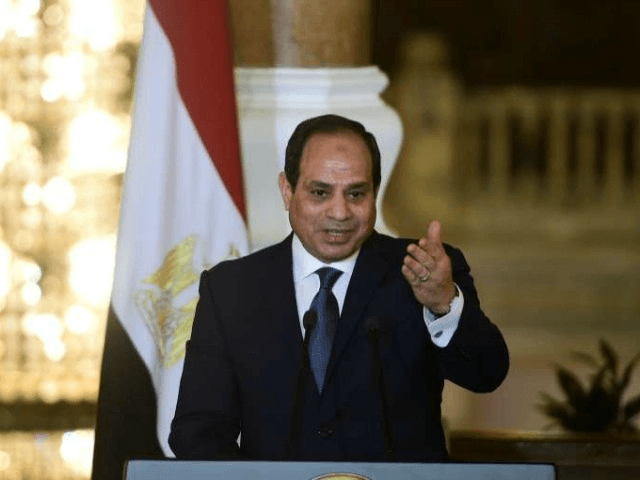A referendum is in progress in Egypt to approve amendments to the constitution that will increase the powers of President Abdel Fattah el-Sisi and allow him to remain in office until 2030.
The reforms would extend Sisi’s current term to 2024 and permit him to run for another six-year term at that time. He won re-election in 2018 with 97 percent of the vote, a level of support critics charged him with reaching by bullying every other plausible candidate out of the race.
Most foreign media reports on last week’s parliamentary approval of the proposed amendments took pains to note the Egyptian legislature is packed with Sisi supporters. Legislators who voted to approve the constitutional changes described them as necessary to maintain social stability and combat terrorism, while critics denounced them as authoritarian.
A public referendum must approve the amendments. The vote began over the weekend and will conclude on Tuesday. The results are scheduled to be announced by Saturday at the latest.
CNN summarized the changes Egyptian voters were asked to approve:
The changes will give the military more power by stipulating its responsibility “to preserve the constitution and democracy, maintain the basic pillars of the state and its civilian nature.”
They also expand Sisi’s power over the legislative branch by creating an upper house known as a senate, a third of whose members will be appointed by the president. The size of the lower house will be reduced, with at least 25% of them reserved for women.
The revised charter also gives the president new authority to appoint members of the judiciary.
According to Egypt’s Ahram Online, the amendments to increase the presidential term and reserve 25 percent of parliamentary seats for women are the most controversial proposals.
ABC News predicted the amendments are “likely to pass due to the haste that surrounded the process” and because Sisi supporters have been festooning the country with “Vote Yes” banners for weeks in anticipation of the referendum.
One fellow who brandished a “vote no” sign found himself promptly arrested, raising allegations of political oppression from the Egyptian opposition:
On Monday, political activist Ahmed Badawi was arrested in New Cairo for holding a sign that said “No to changing the constitution,” according to the Egyptian Commission for Rights and Freedoms. His whereabouts remain unknown.
A video is now circulating recorded by Badawy before his arrest, calling on people to join him as he plans to stand with the sign to raise awareness.
“This is how those who advocate for a no vote are treated in Egypt, while those who urge yes can put up banners, be on TV, make songs, dance outside poll stations,” Mai El-Sadany a Washington-based human rights lawyer, wrote on Twitter.
The Egyptian government has also blocked websites belonging to opposition groups and denied permits for anti-referendum protests.
Reuters quoted the Egyptian electoral commission saying it has “not received any formal complaints so far about any irregularities” in the nascent referendum. The opposition mocked this statement and predicted widespread intimidation and vote-buying using the aphorism “the ticket and the cardboard box,” a sardonic reference to photos that appear to show Sisi supporters handing out boxes of groceries as rewards for those who voted yes.
A Reuters reporter claimed to have personally witnessed voters receiving vouchers for groceries as they departed a polling station in Cairo. Many Egyptians interviewed by foreign news agencies said the grocery rewards are common knowledge among the poor.
The New York Times spotted buses sporting green “Vote Yes” checkmarks in their windows offering free rides to polling stations and spoke to an employee at a snack vendor who said the police forced the owner to hang a banner declaring support for Sisi.
Ahram Online quoted a statement from the Egyptian State Information Service (SIS) dismissing allegations of vote-buying as Muslim Brotherhood propaganda:
The SIS also said that the claims in some of these reports do not make sense, in that they alleged that citizens were being bussed to cities from villages even though there are polling stations near the residences of all citizens throughout the country.
Meanwhile, the Future of the Homeland Party has issued a statement on Monday condemning what it said were supporters of the outlawed Muslim Brotherhood who have tried to distort the image of the party, which is the biggest in Egypt’s parliament.
The party said that the Muslim Brotherhood was spreading false reports that citizens were being bribed in exchange for their vote.
The party said that it has submitted “several reports to the prosecution against a number of individuals, sites and pages funded by the terrorist Muslim Brotherhood and its supporters.”
The party also said that food packages were being handed out by charitable organizations to coincide with the upcoming holy month of Ramadan, and that this has nothing to do with the election.
Opponents of the amendments said their most realistic objective was to keep the margin of victory low, or at least much lower than Sisi’s 97 percent re-election victory, to signal the president’s popularity is waning.
The New York Times advised them to aim even lower and hope the overall turnout for the referendum is low enough to embarrass Sisi, pointing out that the Egyptian president enjoys a great deal of genuine public support in addition to whatever measures his administration is taking to ensure the referendum passes.

COMMENTS
Please let us know if you're having issues with commenting.